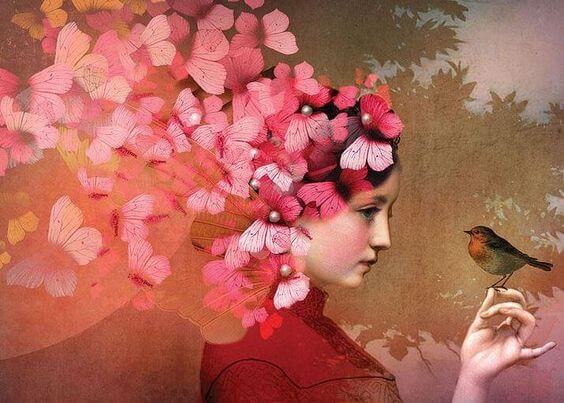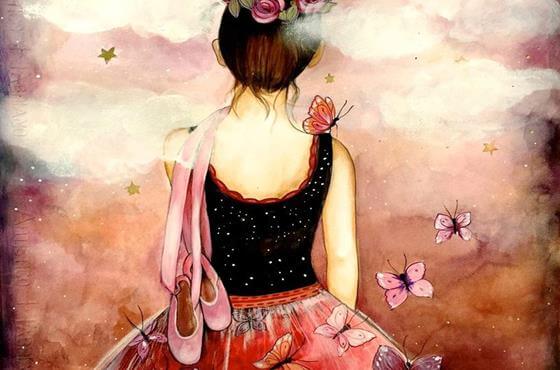We All Have Memories That Ruffle Up Our Souls

There are memories that suddenly ruffle up our souls and give us a knowing, almost cheeky smile, but how therapeutic it is! Because in moments of difficulty there is nothing like turning the key to our memories and letting ourselves be enveloped, little by little, by the essences of yesterday’s happiness which gives us strength again in our present.
Often it is said that the memory gathers wonderful moments that no photograph could ever capture. Because no electronic media can evoke smells, a chill of pleasure in the skin, the taste of a kiss or the fresh breeze of a dawn.
After wonderful moments there are unforgettable memories, those that make us laugh, that ruffle our souls and show us that everything that was once in the mind still lives on in the heart.
One aspect we must keep in mind about the memory is that, despite what many may believe, it is not a bottomless chest. It is not a space of infinite capacity where we store data, images and experiences that correspond faithfully to the reality and keep them locked away. The memory, in fact, is like a canvas capable of creating, of bringing new shades, of transforming and even erasing.

Memories and the lock of our conscience
For William James, a celebrated philosopher, psychologist, and brother to Henry James, memory and consciousness are like a key and lock. Let’s take an example: When listening to a song or a tune, our memory travels instantly to a moment in our past. We do not need a time machine. It is an involuntary memory, just one of many that happen almost without realizing it throughout the day.
We are suspended for a few seconds in that hazy memory, in that moment of time that can have positive or negative effects, until soon after, our conscience calls us and “drags” us back again into the lock of reality. This momentary one-off, but intense journey, far from being totally disconnected from reality and useless, becomes embedded into our own conscience.
We spend much of our lives remembering things and evoking our past and we do it because, as neuroscience explains, memory is that eternal traveler which invites us to its vast island to evaluate the past, to act in the present and to plan our future. All of this is built in to our consciousness, in that flowery, chaotic and distinctive “everything” that characterizes each one of us.

The need to be architects of our present to create positive memories
“Positive experiences create happy memories”. This is something we all know is a no-brainer, and besides,but it is also clear to us that it is not always in our power to create happy, joyful or pleasant experiences. Sometimes luck is not in our favor, there are disappointments, changes of direction in our paths, traumatic experiences and even gray days.
“Remembering is easy for those who have memories, forgetting is difficult for those who have hearts.”
-Gabriel Garcia Marquez-
Now, one aspect which we spoke of at the beginning and which we return to now, is the one concerning the memory, and that it is not always a faithful reflection of the facts. The same reality experienced by two people can be remembered in a different way, because each of us interpret and perceive what we see in one way or another, and that is where the magic and the mystery of human memory resides. The brain is not a camera, nor a photocopier, the brain is a great interpreter.
However, this fact is a fabulous weapon that works in our favor. Keep reading. We’ll explain why.

The memory and the emotions
All of us can be architects of our own reality and make use of our memory and emotions to proceed along our personal paths with greater confidence and strength. To do this, consider these strategies.
- The selective memory that allows us to heal wounds. Let’s take an example: you just broke up with someone. One way to confront the grief is to avoid concentrating our memories on negative or traumatic events. In doing so, we do not advance and we become captives of suffering. It is about accepting, about being able to close a part of our life, and about allowing the good memories we have experienced to have more value than the negative ones. Only then will we see it as a “life that was worth living.”
- The memories we have when we are suffering depression can be a double-edged sword. According to an interesting study published in the journal Frontiers in Psychology, inviting a patient with depression to remember happy moments from their past can be counterproductive. In these cases, it has been seen that the brain is unable to activate its “reward circuits”, since depressive people are characterized by that state of mind in which they are unable to enjoy memories or positive experiences.

So, in moments of darkness, before we go back to the past to our “memory chest”, it is best to “build the present”, to connect with the here and now in order to realize that sometimes it is enough to simply change a thought we are having, in order to create a new emotion capable of improving our reality. Sometimes the engine of change only needs that vital spark: a positive, hopeful emotion.
This text is provided for informational purposes only and does not replace consultation with a professional. If in doubt, consult your specialist.








